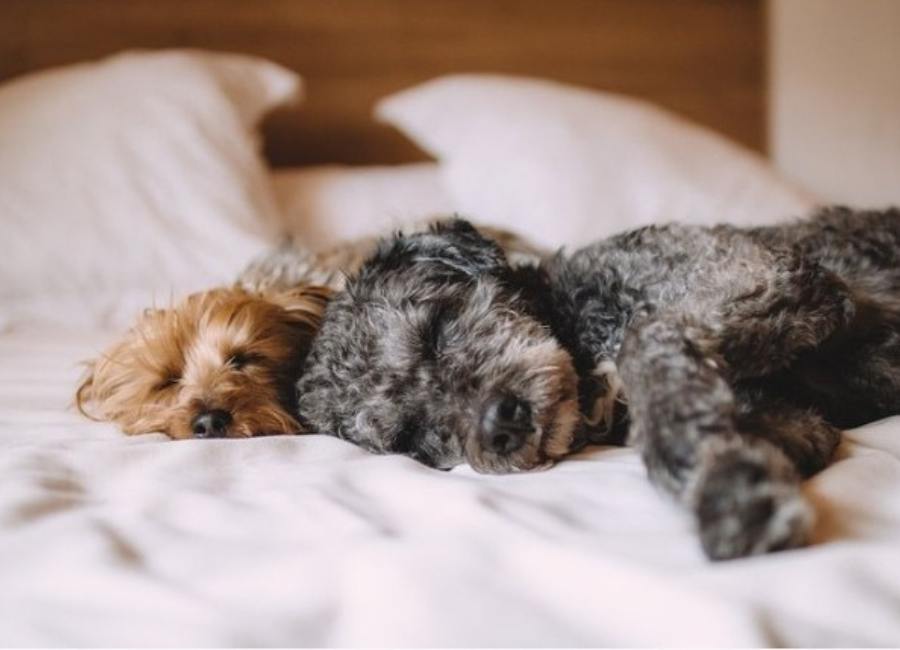9 Reasons Why Your Dog Sleep All Day

Does your dog sleep all day? If so, you’re not alone!
Many dog owners wonder why their furry friends are so sleepy.
In this blog post, we’ll explore the reasons why dogs sleep so much and how to ensure they get enough rest.
Benefits of dogs getting enough sleep
Dogs should sleep for about 10 hours a day, as this is necessary for their health and welfare.
A healthy sleep schedule enhances immunity, lowers stress levels, and can help with behavioral issues including hyperactivity and aggression.
Also, obtaining adequate sleep can lower the incidence of obesity in dogs and improve cognitive performance.
Potential reasons why your dog sleep all day
Here are common reasons why dogs sleep all day:
A dog’s age
Dogs’ metabolisms slow down as they get older, and they could become less active.
Age-related health conditions, such as arthritis, heart disease, or kidney illness, can also impair an older dog’s energy levels.
These variables collectively may lead to them sleeping more during the day.
Tips
Provide older dogs with a cozy, sturdy bed to aid alleviate any joint discomfort.
Short walks or swimming are both low-impact exercises that can maintain mobility and improve general health.
Breed of dog
Energy needs and activity requirements vary between breeds.
For instance, energetic breeds like border collies or Jack Russell terriers could need more exercise to feel content and sleep less during the day.
Low-energy breeds, such as basset hounds or bulldogs, may choose to nap more and play less.
Tips
It is important to make sure the dog gets enough exercise and is active for their breed.
While low-energy dogs might prefer shorter walks or more mental stimulation, high-energy dogs may need more strenuous exercise.
Health Issues
A dog may require more sleep to help them recover if they are in pain or discomfort as a result of health problems.
Dogs who have hip dysplasia or arthritis may sleep more to reduce their pain.
Chronic illnesses in dogs, such as renal or heart problems, might cause them to feel more worn out and require more sleep.
Tips
Together with your veterinarian, handle any ongoing conditions the dog may have and create a cozy, secure environment for it.
Giving joint supplements or pain relievers can help reduce discomfort and lessen pain.
Weather
Dogs are susceptible to the weather’s effects just like people are.
When it’s hot and muggy outside, dogs might feel uneasy and want to rest somewhere cooler.
Moreover, dogs with thick coats could have a harder time controlling their body temperature, resulting in greater daytime slumber.
Tips
Provide your dogs with a cool, shaded place to rest during the summer.
Don’t leave them in a car or outside in the heat; make sure they have access to plenty of water.
Boredom
Dogs are sophisticated creatures that require mental and physical exercise to maintain good health.
A dog may become bored and lethargic if they do not get enough fun or exercise.
This may result in excessive daytime sleepiness.
Tips
Provide your dog with a lot of opportunities for physical and mental activity, playtime, and puzzle toys.
Your dog can benefit from mental stimulation by participating in training sessions or being introduced to new hobbies.
Poor Nutrition
The food of a dog has a big impact on how energetic they are.
A dog may feel weak and lethargic if they are not getting enough nutrients or is consuming poor-quality food.
This may result in excessive daytime sleepiness.
Tips
Provide the dog with a high-quality diet that is suitable for its age and level of exercise.
Ask your vet for advice on the best food to feed your dog based on his or her specific requirements.
Anxiety
In order to cope with their anxiety or stress, agitated or worried dogs may sleep more.
Many reasons, like separation anxiety, loud noises, or changes in habit, might contribute to anxiety.
Tips
Provide the dog with a tranquil and secure environment.
Consult a veterinarian or a qualified dog trainer for advice on how to handle dogs’ tension and anxiety.
Daily Schedule
Dogs appreciate routine and flourish when they know what to expect.
A dog may sleep more to pass the time if their daily routine does not provide them with adequate stimulation.
A dog can be kept engaged and energetic by getting regular exercise, playing, and mental stimulation.
Tips
Have a consistent daily schedule for your dog that includes time for play and exercise.
Engaging in training, puzzle toys, or other activities, stimulate the dog’s mind.
Nighttime Activity
Some dogs sleep more during the day to make up for their lack of sleep because they are more active at night.
This might be the result of things like a shift in the routine or sleeping environment, the addition of a new pet to the household, or underlying health difficulties.
Tips
Make sure your dog has a peaceful and pleasant place to sleep.
If you think your dog’s nighttime activity might be brought on by a health problem, talk to your vet.
How to encourage a healthy sleep pattern in dogs
Here are some tips to help your dog sleep well:
- Create a cozy sleeping area: Provide a pleasant sleeping space for dogs because they require a peaceful environment. Provide your dog with a comfortable bed in a peaceful area of the house so that they can rest well.
- Maintain a routine: Make an effort to provide your dog with a regular sleep pattern. Dogs are creatures of habit, so a consistent sleeping schedule will make them feel safer and at ease.
- Exercise your dog during the day: Dogs are more likely to sleep soundly at night when they are exhausted. Make sure your dog has ample fun or walks throughout the day.
- Minimize noise and light: Limit noise and light because dogs might be sensitive to both, which can interfere with their ability to sleep. Make an effort to reduce light and noise in your dog’s sleeping space to foster a serene atmosphere.
- Avoid late-night feeding: Avoid feeding your dog after midnight because it may disturb their sleep. Try not to feed your dog right before night.
- Keep your dog at ease before night: Make an effort to keep your dog at ease before bed. Eliminate loud activities like fetch and instead provide calm hobbies like gentle brushing or massages.
- Consider crate training: A good option to make your dog feel safe and at ease in their sleeping space is to train them to use crates. So it’s crucial to introduce the crate gradually and guarantee that it’s the right size for your dog.
- Handle any fear or anxiety: Fear and worry can keep a dog from sleeping. If your dog is having these problems, it’s crucial to address the underlying causes and create a strategy with the help of a veterinarian or a trained animal behaviorist to lessen their fear or anxiety.
- Avoid excessive caffeine or sugar: Caffeine and sugar can influence dogs just like they can humans, so try to limit your intake. Give your dog no snacks or meals with these items, especially right before night.
- Think about offering your dog a calming supplement: Certain remedies, including chamomile or lavender, may aid in relaxing and calming dogs. Once more, it’s crucial to speak with a professional before giving your dog any supplements.
- Give mental stimulation: Giving your dog cerebral exercise throughout the day will help them become more tired at night and encourage healthier sleep. To keep your dog’s mind active, consider providing puzzle toys or engaging games.
Activities to keep your dog awake and busy during the day
You can involve your dog in physical pursuits throughout the day like walks, runs, fetch, and playtime, to keep them alert and occupied.
By giving them interactive toys, food puzzles, and other enrichment activities, you may also give them mental stimulation.
You can keep your dog entertained and mentally active by giving them interactive toys and food puzzles.
To engage their senses and excite their minds, you can also let your dog explore the backyard or the neighborhood.
To improve learning and engagement, you can play training games with your dog.
As a final option, you may enroll your dog in lessons or a doggie daycare to make sure they receive adequate mental and physical stimulation throughout the day.
Signs of Insufficient Sleep in dogs
Lethargy or decreased energy, impatience, amnesia or inability to recall simple orders, disorientation or confusion, increased aggression, whining or wailing, and decreased activity levels are all symptoms of insufficient sleep in dogs.
Moreover, dogs may become more sensitive to stress, pant more frequently, have trouble breathing, and have trouble falling asleep.
It is crucial to consult your veterinarian if your dog is exhibiting any of these symptoms in order to rule out any underlying medical concerns and to decide the best course of action.
Conclusion
In conclusion, dogs need plenty of rest to stay healthy and happy.
With the right amount of sleep, exercise, and nutrition, your pup can live a long and healthy life.
Puppies need at least 11–20 hours of sleep per day, while adult dogs typically need 12–14 hours.
So, if your pup is healthy and sleeping all day, don’t worry! It’s likely just getting the rest it needs to stay healthy and happy.



![Resource Guarding in Dogs [Signs, Causes, & Fixes] Resource Guarding in Dogs](https://petcreeks.com/wp-content/uploads/2023/10/pexels-zen-chung-5749096.jpg)
![Why Do Dogs Destroy Toys [15 Potential Reasons Explained] Why Do Dogs Destroy Toys](https://petcreeks.com/wp-content/uploads/2022/11/Why-Do-Dogs-Destroy-Toys-768x555.jpg)
![Beagle Lifespan [9 Factors to Consider] Beagle Lifespan](https://petcreeks.com/wp-content/uploads/2023/05/Beagle-Lifespan-768x555.jpg)
![Great Pyrenees Separation Anxiety [Explained] Great Pyrenees Separation Anxiety](https://petcreeks.com/wp-content/uploads/2023/04/Great-Pyrenees-Separation-Anxiety-768x555.jpg)